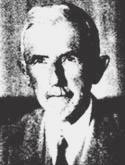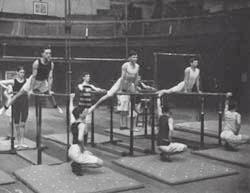|
Russel Henry Chittenden (1856-1943) After graduation, Chittenden traveled to Heidelberg, where he worked with the notable enzyme chemist Wilhelm Kühne (1837-1900; first to refer to organic catalysts as "enzymes" in 1878). Surprisingly, Kühne had read Chittenden's article on glycogen in scallops. In his memoirs, Chittenden recalled:
Chittenden attended classes in advanced chemistry (given by Professor Robert W. Bunsen--the Bunsen burner bears his name), anatomy, surgery, and pathology, and visited German laboratories where he met distinguished researchers. The year's experience at Heidelberg resulted in three publications and influenced his approach to science. In 1880, Chittenden received the first PhD degree in physiological chemistry from an American university (Yale). Two years later, he became Professor of Physiological Chemistry at Sheffield, a post he held for the next 40 years. Chittenden published 144 scientific papers, including a text on nutrition with special reference to protein requirements (Chittenden, 1904). This text refocused attention on the minimal protein requirement while resting or exercising, and influenced future research in nutrition and exercise physiology. After studying laborers who consumed approximately 3100 kcal (13 MJ) daily, the distinguished German physiologists Carl Voit (1831-1908) and Max Rubner (1854-1932) maintained that protein intake should be either 118 g per day (Voit) or 127 g per day (Rubner); the American chemist Wilbur O. Atwater (1844-1907) recommended a protein intake similar to Rubner's. Recommendations for protein intake were even higher for soldiers doing hard physical labor (Voit 145 g; Rubner 165 g; Atwater 150 g). In contrast, Chittenden's experiments contradicted these figures because they showed that no debilitation occurred in normal and athletic young men (including himself) subsisting on low protein diets.
Chittenden's data included daily dietary and urine histories to determine nitrogen excretion (protein utilization). For nine months, he recorded his own body weight. Although it decreased from 65 to 58 kg, and his daily protein intake was one third of what Voit recommended to maintain nitrogen equilibrium, Chittenden's health remained excellent without compromising physical vigor or muscular tone. In a year-long study, athletic men in excellent health on a low protein diet (less than 1 g per kg daily) likewise suffered no deterioration of health or ability to perform arduous physical tasks. Chittenden's data proved that, even without a large protein intake, individuals could maintain their health and fitness. Chittenden summarized his findings:
References Chittenden, R. H. (1904). Physiological economy in nutrition, with special reference to the minimal protein requirement of the healthy man. An experimental study. New York: Frederick A. Stokes Company. Vickery, H. B. (1947). Russel Henry Chittenden. Biographical memoirs, XXIV. Washington, DC: National Academy of Sciences. Copyright ©1998 |

 Chittenden excelled in chemistry at Yale's
Sheffield Scientific School, where his senior project investigated why
leftover scallops tasted sweeter when recooked. Chittenden discovered
that muscle tissue contained large amounts of free glycogen. With encouragement
from his mentor, Chittenden published his paper in the American
Journal of Science in 1875, and republished in a British and German
journal
Chittenden excelled in chemistry at Yale's
Sheffield Scientific School, where his senior project investigated why
leftover scallops tasted sweeter when recooked. Chittenden discovered
that muscle tissue contained large amounts of free glycogen. With encouragement
from his mentor, Chittenden published his paper in the American
Journal of Science in 1875, and republished in a British and German
journal  Young male subjects performing strenuous
gymnastic exercise during a year long experiment at Yale University
on the effects of "minimal" protein intake on upper and lower
body muscular strength and various measures of physical fitness.
Young male subjects performing strenuous
gymnastic exercise during a year long experiment at Yale University
on the effects of "minimal" protein intake on upper and lower
body muscular strength and various measures of physical fitness.
 Two Yale athletes of many who maintained
muscularity despite what was considered by European nutritionists
as suboptimal protein intake (about 0.9 g/kg body mass per day).
The European advocates of a high protein intake believed that
strenuous daily workouts on a low protein intake would cause the
muscular system to weaken, making subjects look emaciated. Chittenden
included these photographs to emphasize that consuming minimal
protein as part of the total daily food intake would not diminish
muscularity.
Two Yale athletes of many who maintained
muscularity despite what was considered by European nutritionists
as suboptimal protein intake (about 0.9 g/kg body mass per day).
The European advocates of a high protein intake believed that
strenuous daily workouts on a low protein intake would cause the
muscular system to weaken, making subjects look emaciated. Chittenden
included these photographs to emphasize that consuming minimal
protein as part of the total daily food intake would not diminish
muscularity.